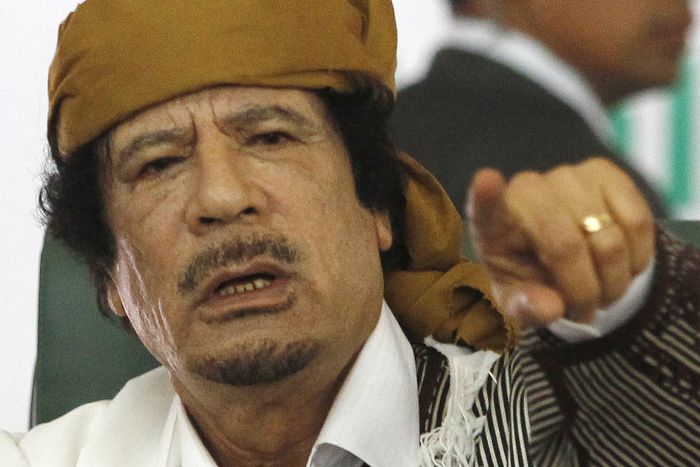Good Riddance for Gaddafi

The most noteworthy aspect of the rebellion in Libya and today's death of Muammar Gaddafi is that it took so long.
When the rebellion started last February -- catching the world by surprise, since it was spontaneous and without advance planning -- it was initially expected to be quick and decisive.
Libya was (or seemed) one of the few rebellions by the people, with nothing resembling an army coup, palace revolt, or underground plotting. In the eastern part of Libya, notably Benghazi, people just had enough, were not going to take oppression any more, and rebelled.
Quickly the Western world took stock of what was happening, and at first lent cautious morale and verbal support, wishing the rebels good luck, but with some skepticism.
When Gaddafi loyalists counter-attacked, and looked as if they might crush the rebellion, countries like France and Britain urged Western involvement.
The U.S. Administration of President Barack Obama refused to take the lead, but offered support if other countries bit the bullet, so to speak, and led the way. Thus, the air war began, with expectations that air attacks would neutralize Gaddafi's air force, his artillery, his tanks, and mechanized forces. But no Western ground troops.
Some were predicting victory within 48 hours, at which time the way would be clear for the rebels' rag-tag "people's army" to sweep west along the coast to Tripoli and beyond.
This didn't happen. Against prevailing logic, Gaddafi's forces were tougher and more determined that anyone expected. For some eight months, Gaddafi held on, steadily losing ground but holding off the rebels.
It became apparent that air power alone was insufficient to crush Gaddafi.
Canada was an enthusiastic supporter of the air war, and hundreds of missions against Libyan targets that didn't shoot back amounted to virtual target practice for Canadian pilots and their eventually-to-be-replaced CF-18 jets.
The same for British, French and American strike aircraft.
The Arab League endorsed the Allied efforts to attack Gaddafi. Our politial leaders insisted we were shooting up Libya to protect civilians, not in an effort to replace Gaddafi's oppressive regime. Nonsense, but that's international diplomacy.
Gaddafi was true to his word that he had no intention of leaving Libya. Unlike most despots, he did not flee to a friendly tyranny for refuge. He stayed and fought. He may have been nuts, but he was resolute.
Exactly how he died, is as yet unknown. Photos at the scene show a wounded Gaddafi, his face contorted, blood soaking through his shirt, a man in obvious pain.
He apparently had gunshot wounds on his legs, and if he didn't bleed to death, he was almost certainly dispatched. And a good thing too. The very last thing anyone wanted was Gaddafi as a prisoner facing a war crimes trial which he would certainly have turned into a circus.
Thus 42 years of his rule has ended -- starting in 1969 when as handsome young officer and admirer of Egypt's Gamal Abdel Nasser he deposed Libya's King Idris in an army coup, and ending as a grotesque blood-soaked relic that was more cartoon character than tyrant.
Some accounts of his death say he was begging for mercy. Maybe, maybe not.
But good that he's gone.
The question now is whether the ruling National Transitional Council (NTC) is a democratic as our side hopes it will be. Odds are it won't be. They never are. Their leaders -- many are Gaddafi turncoats -- have no background in democracy and lean towards autocracy. Remember, power corrupts. And these guys now have power.

